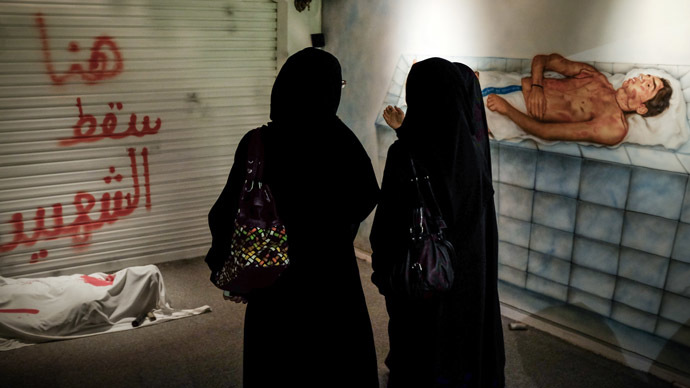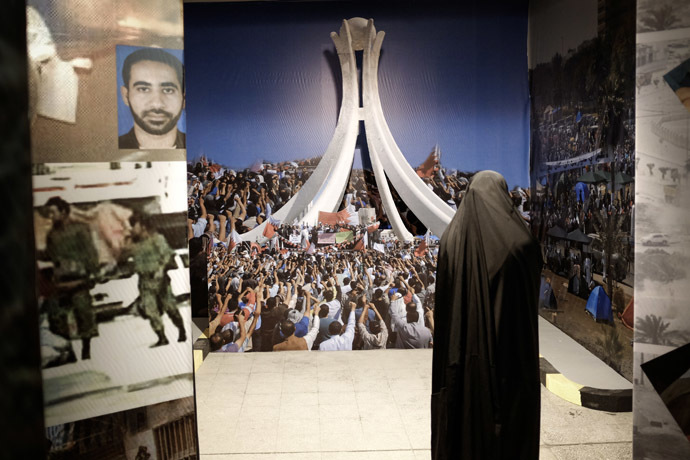This aerial image made from an Egyptian army helicopter shows a general view of a pro-military rally in Tahrir Square, the epicenter of the 2011 uprising, in Cairo, Egypt, Saturday, Jan. 25, 2014. Egyptian riot police have fired tear gas to disperse hundreds of supporters of ousted Islamist President Mohammed Morsi protesting as the country marks the third anniversary of the 2011 uprising, as supporters of the military gathered in rival rallies in other parts of the capital, many of them urging military chief el-Sissi, the man who removed Morsi, to run for president.(AP Photo/Hassan Ammar)
CAIRO (AP) — The anniversary of Egypt’s 2011 uprising brought a violent display of the country’s furious divisions Saturday, as giant crowds danced at government-backed rallies and security forces crushed demonstrations by rival Islamists and some secular activists.
Clashes nationwide killed at least 29 protesters, health officials said. The starkly contrasting scenes reflect the three years of turmoil Egypt has faced since the Jan. 25, 2011 revolution began and ultimately toppled autocrat Hosni Mubarak, replacing him with a transitional military council.
Last summer’s millions-strong demonstrations against Mubarak’s elected successor, Islamist President Mohammed Morsi, led to a military coup removing him. And as Egypt looks forward to presidential elections later this year, many celebrating Saturday in the famed Tahrir Square demanded army chief Abdel-Fattah el-Sissi run for president.
“El-Sissi saved the nation. It was up in the air like this helicopter and he carried it to safety,” said Mervat Khalifa, 62, sitting on the sidewalk and waving to a helicopter overhead.
Military helicopters showered crowds in Tahrir with small flags and gift coupons to buy refrigerators, heaters, blankets and home appliances. State-backed rallies also showcased prancing horses and traditional music for ecstatic crowds.
Morsi’s supporters used Saturday’s anniversary to build new momentum in their defiance of the military and its political transition plan, despite being hit by a crippling police crackdown and rising public resentment against his Muslim Brotherhood group.
“Anger is bigger than all. Repression sparks revolutions. The burning of Egypt won’t last,” a statement issued by a Brotherhood-led coalition said.
The fiercest clashes raged in an eastern Cairo suburb, where Islamist supporters fought with security forces for hours in pitched street battles. Troops fired over the crowd to disperse protesters who threw gasoline bombs. Protesters set up a field hospital to aid the wounded.
Violence also was strong in the provinces. A car bomb exploded outside a security camp in the city of Suez, where gunmen clashed with police, witnesses said. Nine civilians were wounded in the bombing, authorities said.
In neighboring Ismailiya, protesters chanting “down with military rule” also battled security forces. In Alexandria, a female protester was shot and killed during clashes, officials said.
Two protesters were killed in the southern city of Minya, security officials said.
The clashes in the eastern Cairo suburb of Alf Maskan were fiercest.
Protesters Mustafa Mohammed and Sami, who only gave his first name for fear of reprisals, said security personnel and rooftop snipers used live rounds against demonstrators. The gunfire struck a natural gas pipeline three times, Mohammed said.
Sami said protesters threw gasoline bombs in the clashes, which wounded hundreds. Two security officials in the area described the situation as tense and said at least six people were killed. The protesters put the figures at 24. It was not immediately possible to reconcile the figures.
The clashes contrasted with scenes of celebration in Tahrir Square and other major squares in provincial capitals, where long queues of demonstrators lined up to enter the tightly secured areas through metal detectors.
Some celebrating wore paper masks with el-Sissi’s picture and their rallies showed a ferociously anti-Islamist tone.
Soldiers guarding Tahrir Square joined them in chanting: “The people want the execution of the Brotherhood.” A crowd beat a woman in a conservative headscarf and drove her away, believing she was a Brotherhood sympathizer.
Crowds also turned on journalists. More than a dozen journalists were beaten by the demonstrators, or detained by police for protection from angry crowds. Demonstrators chased one Egyptian female journalist, mistakenly believing she worked for satellite news broadcaster Al-Jazeera — seen as pro-Brotherhood. They pulled her hair and tried to strangle her with a scarf until police took her into a building for protection.
Security forces also dispersed rallies by secular youth activists who led the 2011 anti-Mubarak uprising and who are critical of both the Islamists and the military. A number of their most prominent figures have been detained for months or sentenced to prison amid a campaign to silence even secular voices of dissent.
One prominent activist, Nazly Hussein, was detained by police on the subway as she headed to join one rally downtown, her mother Ghada Shahbendar said. Hussein’s lawyer, Amr Imam, said that when he went to see her at the police station, a policeman shoved him, pointed his rifle at him and warned him he had 10 seconds to leave or he’d shoot.
Police used tear gas to disperse one small gathering by secular activists in the Cairo neighborhood of Mohandessin, beating and kicking at least one of them, several participants said. The groups later issued an appeal to their supporters to withdraw from street protests because of “excessive violence” by security forces.
“The only thing allowed is el-Sissi revolutionaries,” one of the activists, blogger Wael Khalil, said with a laugh. “Do they think that there will be working democracy this way?”
In its statement, the Brotherhood appealed to secular youth groups to unite with it in protests.
Secular youth groups, however, have shunned the Islamists, whom they equally accuse of undermining the 2011 uprising’s goals while in power.
The rallies took place in an atmosphere of fear, a day after four bombs targeting police killed six people around Cairo. Another 15 people were killed around the country Friday when Morsi’s supporters clashed with security forces. The Interior Ministry said that 237 people were arrested during those protests.
The al-Qaida-inspired group Ansar Beit al-Maqdis, or the Champions of Jerusalem, claimed responsibility for Friday’s bombings, warning of coming attacks and telling citizens to stay away from police stations.
“We tell our dear nation that these attacks were only the first drops of rain, so wait for what is coming,” read the statement, posted on militant websites.
The group, based in the lawless Sinai Peninsula, has claimed responsibility for the failed assassination attempt on the interior minister in September and a suicide bombing in a Nile Delta city that killed 16. The group calls its attacks revenge for the killings of pro-Morsi supporters and the military offensive in Sinai.
The government has accused the Brotherhood of ultimately being behind the militant violence and declared the group a terrorist organization. It has produced no proof publicly and the group says the accusation is baseless.
But pro-government media — which means most Egyptian television stations and newspapers — tout the link and a broad segment of the public are convinced. They note the Brotherhood’s alliances with radicals while Morsi was in office, street violence by his supporters during and after his rule and the militants’ own pronouncements that they are retaliating for his ouster.
Early Saturday, a bomb exploded next to a police training institute in eastern Cairo, only damaging the facility’s walls.
Ahmed Mahmoud, an engineering student living nearby, said angry residents quickly blamed the Brotherhood.
“People were saying they will carry arms and kill all Muslim Brothers who dare to pass by,” he said.
___
Associated Press writers Laura Dean and Maamoun Youssef contributed to this report.
Associated Press












